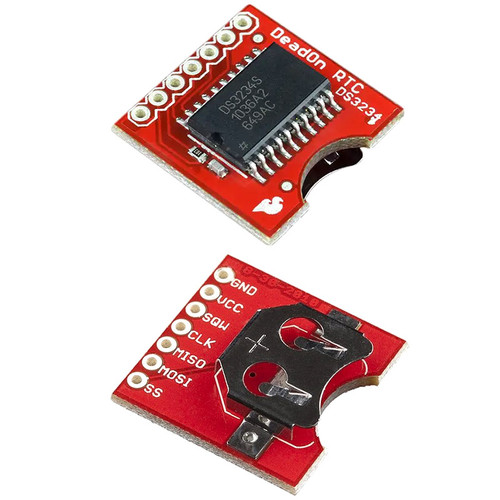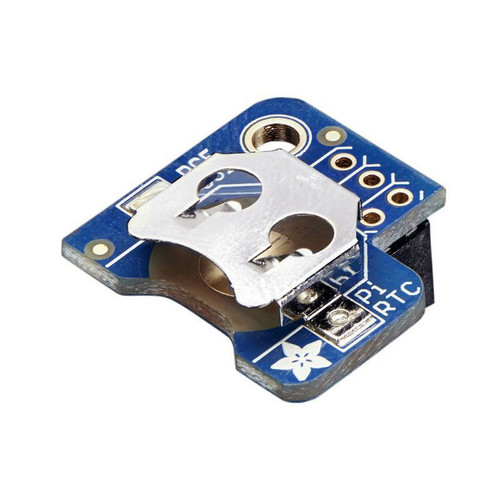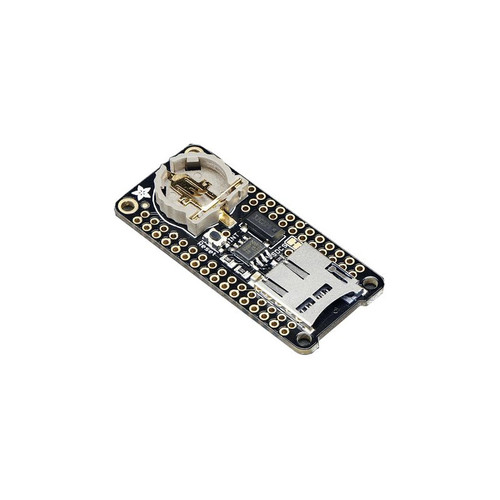Top RTC Clocks for Low Power, Accurate Time Management
RTC (Real-Time Clock) modules from trusted brands like SparkFun, Waveshare, and 7Semi are essential for maintaining accurate time, even during power interruptions or sleep mode. These modules are ideal for embedded systems, microcontroller projects, and applications requiring precise time management. With low power consumption, battery backup, and easy integration through I2C or SPI interfaces, these RTC clocks ensure reliable timekeeping for Arduino, Raspberry Pi, and other platforms. Their compact design and wide compatibility make them perfect for time-sensitive tasks in wearables, IoT devices, and data logging systems.
Key Features and Benefits
- Accurate Timekeeping: RTC clocks are specifically built to provide reliable time tracking without interruptions. They operate independently of the main system clock, ensuring consistent accuracy whether the main system is running or powered down.
- Low Power Consumption: Many RTC modules are designed to consume minimal power, making them perfect for battery-operated or energy-efficient devices. This helps in maintaining time even when the main system is in low-power or sleep modes.
- Battery Backup: Most RTC clocks come with a built-in battery backup, ensuring they keep time even during power outages or when disconnected from a power source. This feature is critical for long-term projects, ensuring continuity without the need for frequent resets.
- I2C Interface: These modules often feature an I2C (Inter-Integrated Circuit) interface, which makes integration with microcontrollers like Arduino and Raspberry Pi straightforward. This communication protocol allows easy connection and control with minimal wiring.
- Small Form Factor: The compact size of RTC clock modules makes them suitable for projects where space is limited, such as wearables, compact IoT devices, or embedded systems.
- Wide Compatibility: RTC clocks are compatible with a range of microcontrollers, including popular platforms like Arduino and Raspberry Pi. This ensures that hobbyists, students, and professionals alike can easily incorporate real-time clocks into their projects.
Popular Products
Here are some standout RTC clock modules you can explore:
- Real-Time Clock RTC Module RV-1805 Qwiic I2C SparkFun: Known for its ultra-low power consumption and I2C interface, this module is perfect for maintaining precise time in power-sensitive projects. It’s highly compatible with various platforms and features battery backup.
- 7Semi Real Time Clock Breakout - RV-8803: This RTC breakout board offers excellent timekeeping accuracy and features a small form factor, making it ideal for projects where size constraints are a concern. It is also equipped with battery backup to maintain time even during power outages.
- Si5351A Clock Generator Breakout Board 8~160MHz: While not strictly an RTC, this clock generator module provides a flexible solution for generating precise frequencies for various timing applications. It is especially useful for RF applications and frequency synthesis projects.
Applications of RTC Clocks
RTC clocks are essential in several industries and applications:
- Wearable Devices: Accurate timekeeping is a crucial feature in wearables, from fitness trackers to smartwatches. The low power consumption of RTC modules makes them a perfect fit for these compact devices.
- IoT Projects: Internet of Things (IoT) devices often rely on precise time schedules for data logging, task execution, and synchronization. RTC modules help ensure these tasks are performed reliably.
- Data Logging: In systems where data is logged over time, such as weather stations or environmental monitoring devices, accurate timestamps are essential. RTC clocks ensure that time data remains correct, even in cases of power failure.
- Embedded Systems: Embedded systems often need to perform tasks on precise schedules, such as triggering sensors or controlling outputs. RTC clocks allow for the seamless execution of these time-dependent tasks.
Choosing the Right RTC Clock
When selecting an RTC clock, consider factors like power consumption, interface compatibility, and accuracy. For projects that require long-term timekeeping without frequent battery changes, look for modules with ultra-low power consumption. Ensure the RTC clock has the appropriate interface (typically I2C or SPI) for easy integration with your microcontroller. For the most demanding applications, such as those involving precise scheduling or data logging, accuracy is paramount.













